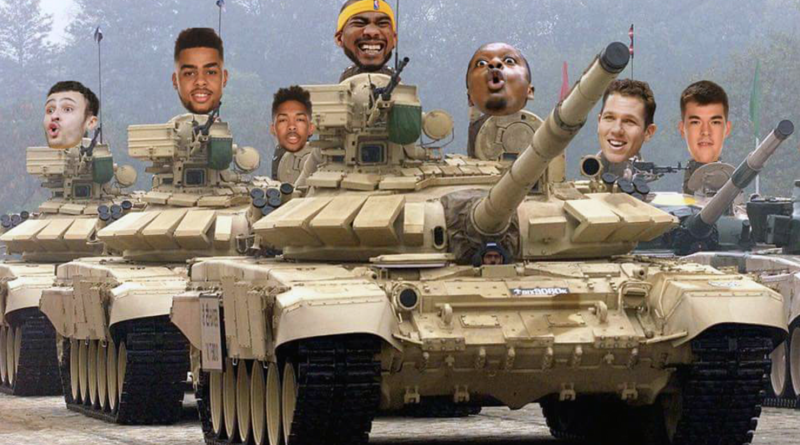Lakers and Mavs are in the tank, diving for rings

In this golden age of free agency you might assume the value of a basketball player is commensurate with the size of his contract, that there’s a relationship between millions earned and minutes played. But it’s not nearly that simple.
The subtext of any NBA contract decision could be a full college course, with all its elements of tax law, labor law, the laws of probability and capology. Throw in some analytics and medical diagnostics.
The most important element: timing. The player’s age, his contract length, the team’s declining performance combine to send him away, to finish out the season on somebody else’s roster.
Some players, even well-established ones, may feel they’re on a surreal carousel. Thanks to buyouts, point guard Deron Williams is owed $18 million by the Brooklyn Nets and $2.5 million by the Dallas Mavericks. And all while making $500,000 to play for the Cleveland Cavaliers.
At this point in the post-midseason, if there’s no justifiable expectation of a playoff run it’s time to look to the future.
We saw the usual flurry of activity at the Feb 23 trade deadline. The Houston Rockets acquired the Los Angeles Lakers’ best shooter and scorer, Lou Williams. While the Rockets looked to the postseason, the Lakers looked to future seasons and received Houston’s first-round pick in the next draft.
With the trading period over, we continue to see contract disposal, whether by buyout or waiver wire. Four days after the trade deadline the Mavs waived their point guard Deron Williams, who was averaging 13 points and 6.9 assists per game. He is a useful backup for the overworked Kyrie Irving.
With the downtrodden there is the possibility of managerial shakeup. Perhaps at the highest level, as with the Lakers going from smoke-and-mirrors to Magic Johnson.
Phil Jackson in New York and Rob Hennigan in Orlando, among others, are feeling media heat. Hennigan is having his fourth consecutive losing season as a general manager. Jackson is a president who still likes to coach on occasion. The Knicks’ best player, Kristaps Porzingis, complained that his Triangle offense is “confusing.”
The most resilient and resourceful of the playoff-deprived teams re-adjust by using all of these various tools as they commit to developing young talent to pursue rings.
The Lakers and Mavericks are examples of what the more successful franchises do in non-playoff years. They unloaded aging assets (L. Williams is 30, D. Williams is 32). And in doing so they promoted goodwill with contenders with whom they will need to negotiate in the future.
The Lakers paid Timofey Mozgov and Luol Deng a combined $33 million this season to sit on the bench. They prefer their young core to play together on a nightly basis. The young players will not be very competitive the rest of this season, but they will develop cohesion while polishing their individual skills.
Of course, the green team will lose lots of games and thereby gain more ping-ping balls for the draft lottery. The Lakers are determined to hang onto their top-3 protected first-round pick.
This puts the coach, Luke Walton, in a difficult and ironic position. He urges his players to go all out. He chastises them for being “soft” on defense. Yet he really doesn’t want them to win. Not yet.
This is not to say the Lakers spent wisely on Mozgov and Deng. But it’s not like they couldn’t afford some expensive mistakes. They were playing with television megadollars in one of the world’s largest media markets.
It’s hard to fault them for not devoting game time to veterans who can help them a little bit now and not at all in the future. Tanking, this is called.
You can’t blame the Lakers for manipulating the odds on acquiring the country’s most talented young amateur. Lonzo Ball is 19, playing in their own backyard of UCLA after growing up in Anaheim.
Alas, Lonzo is burdened by a loudmouthed father, LaVar Ball, luring the infinite array of Tinseltown microphones and cameras with his stream of proclamations. His son is not just the next Steph Curry but “better than Steph Curry right now.” Talk about putting pressure on your kid.
Meanwhile, tankologists have to be fascinated – and ever perplexed — by the Philadelphia 76ers. This organization is more familiar with tanks than the Pentagon. Seems fitting that their best player, center Joel Embiid, is nicknamed ‘The Process.” The Sixers a decade ago committed to a process that was supposed to make them competitive in three or four years.
They seem strangely cursed. Most of their talent is tied up in bandages. Embiid is likely to be Rookie of the Year while playing only 31 games. Their other great rookie hope, Ben Simmons, has been lost for the entire season. He’s a long time recovering from bizarre surgery to inject bone marrow into his right foot.
Considering the Sixers’ history (zero winning years out of the past 13), you have to expect their rebuilding to take longer than what we’ll see in LA and Dallas. The Mavs were NBA champions six years ago; the Lakers were champs the two years before that. Judging by their recent maneuvers, these two teams haven’t forgotten how it’s done.
